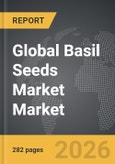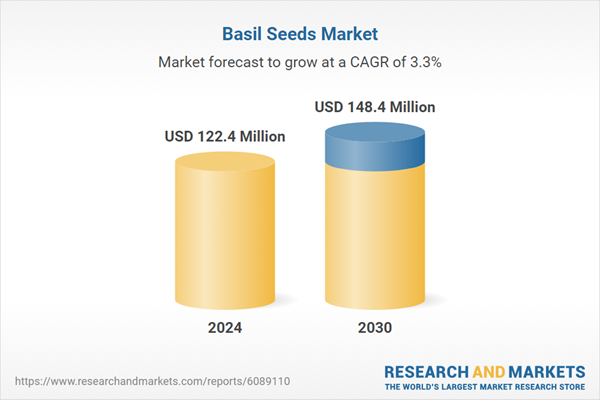Global Basil Seeds Market - Key Trends & Drivers Summarized
Why Are Basil Seeds Gaining Global Attention as Functional Superfoods in Nutraceutical, Beverage, and Specialty Health Markets?
Basil seeds, also known as sabja or tukmaria seeds, are witnessing a significant rise in demand across health-conscious consumer segments owing to their high nutritional density and wide functional benefits. Rich in fiber, plant-based omega-3 fatty acids (ALA), antioxidants, and essential minerals, these seeds are being positioned as natural solutions for digestive wellness, weight management, and glycemic control. Their ability to swell upon hydration and form a mucilaginous gel makes them a popular inclusion in beverages, smoothies, puddings, and functional foods targeting satiety and gut health.The seeds are being increasingly recognized in Western markets for their similarity to chia seeds, yet with faster hydration, neutral taste, and smoother texture. This makes them ideal for product innovation in plant-based, low-calorie, and clean-label food categories. As functional ingredients gain traction in wellness positioning, basil seeds are being incorporated into RTD drinks, vegan yogurt alternatives, and gluten-free baked goods - expanding their applications well beyond traditional Asian or Middle Eastern culinary usage.
Global health and wellness trends are reinforcing interest in naturally derived superfoods with multi-benefit profiles. Basil seeds offer a compelling value proposition: they are calorie-light, shelf-stable, and versatile, while also appealing to vegan, keto, and allergen-sensitive consumer bases. As consumers seek food products that contribute to both nutritional value and sensory novelty, basil seeds are gaining relevance in innovation pipelines across functional nutrition, preventive health, and specialty foods.
How Are Product Formats, Processing Technologies, and Clean-Label Claims Driving Differentiation in the Basil Seeds Market?
The shift from commodity seed usage to high-value, ready-to-use formulations is a defining trend in the evolving basil seed market. De-husked, roasted, pre-hydrated, and flavored basil seed formats are being developed to improve ease of incorporation into food and beverage matrices. Consumer-facing products such as basil seed beverages, dessert cups, and health supplements are moving toward enhanced texture, flavor compatibility, and visual appeal - driven by advancements in hydration kinetics, seed coating, and stabilizer-free formulations.Processing technologies that preserve nutritional integrity while ensuring microbial stability are enabling shelf-stable, minimally processed basil seed offerings. Cold hydration, aseptic packaging, and low-temperature drying are being applied to develop additive-free SKUs that retain mucilage-forming ability and active phytocompounds. Brands are also leveraging freeze-dried or powdered basil seed derivatives to incorporate into protein bars, breakfast cereals, and nutraceutical blends with minimal processing footprint.
Clean-label demand is driving product developers to avoid synthetic additives, preservatives, and artificial flavoring in basil seed formulations. Organic certification, non-GMO labeling, and traceable sourcing from Southeast Asia and India are becoming key differentiators. As consumers become increasingly discerning about ingredient origins and production transparency, basil seed brands are investing in ethical sourcing, sustainable farming partnerships, and recyclable packaging to align with modern wellness and environmental values.
Which End-Use Sectors, Regional Markets, and Distribution Channels Are Accelerating Basil Seed Commercialization?
Functional beverages are the most prominent end-use sector for basil seeds, with numerous regional and international brands launching basil seed-infused drinks in fruit-based, herbal, and dairy-free variants. These products appeal to hydration, detox, and satiety positioning - especially in urban and fitness-focused consumer segments. Foodservice chains, cafes, and wellness retailers are adopting basil seed add-ons in smoothies and dessert offerings, further integrating them into mainstream health-conscious consumption patterns.Nutraceuticals and dietary supplements represent another high-growth application area, where basil seeds are used as natural fiber boosters or omega-3 sources in vegan formulations. Product manufacturers are exploring synergistic combinations with probiotics, herbal extracts, and adaptogens to create gut-friendly, functional blends. Additionally, bakery, breakfast, and snacking categories are gradually incorporating basil seeds into health-positioned innovations that address clean energy, digestive comfort, and immune support.
Regionally, Asia-Pacific leads in both production and consumption due to long-standing culinary familiarity and established sourcing networks. However, North America and Europe are rapidly adopting basil seeds within the broader superfoods trend. Online retail and health-focused specialty stores are key distribution channels in these regions, supported by influencer-driven awareness campaigns and educational marketing. E-commerce platforms also enable small and mid-sized brands to scale niche basil seed innovations into global wellness markets.
How Are Pricing Strategies, Supply Chain Integration, and Regulatory Compliance Shaping Market Scalability?
As demand for basil seeds transitions from bulk commodity trade to premium packaged goods, pricing strategies are shifting to reflect value-added attributes such as origin traceability, organic certification, and processing innovation. Tiered pricing models are emerging, with differentials based on purity, hydration performance, and application-specific pre-treatment. This is allowing brands to serve both mass-market and specialty nutrition segments while optimizing gross margins.Vertical integration across farming, cleaning, and packaging operations is being pursued by several players to ensure quality control, supply reliability, and margin optimization. Strategic sourcing from India, Thailand, and Vietnam - combined with standardized grading and export logistics - are key to mitigating seasonality risks and ensuring consistent quality. Partnerships with certified organic cooperatives and contract farming initiatives are supporting both transparency and long-term volume security.
Compliance with regional food safety regulations, including GRAS status in the U.S. and EFSA guidelines in Europe, is essential for global market penetration. Brands must navigate ingredient registration, nutritional labeling, and allergen declarations as basil seed applications expand across regulated food categories. As regulatory frameworks evolve to accommodate novel superfoods, early compliance and certification will be essential to scaling basil seed innovation into functional and mainstream food ecosystems.
What Are the Factors Driving Growth in the Basil Seeds Market?
The basil seeds market is gaining momentum as superfood-driven innovation, functional beverage growth, and wellness-focused consumer preferences converge globally. Their nutritional density, visual appeal, and textural versatility make them ideal for health-positioned food and drink categories.Key growth drivers include the rising demand for plant-based and allergen-friendly ingredients, the mainstreaming of clean-label superfoods, and innovation in ready-to-consume and hybrid basil seed formats. E-commerce expansion and global health trends are further amplifying reach across consumer demographics and geographies.
As consumer expectations around nutrition, sustainability, and sensory engagement intensify, could basil seeds emerge as a next-generation staple ingredient - bridging the gap between ancient wellness traditions and modern functional food innovation?
Report Scope
The report analyzes the Basil Seeds market, presented in terms of market value (US$). The analysis covers the key segments and geographic regions outlined below:- Segments: Type (Sweet Basil Seeds, Scented Basil Seeds, Holy Basil Seeds, Purple Basil Seeds); Application (Cultivation Basil Seeds, Medicinal Basil Seeds, Other Applications).
- Geographic Regions/Countries: World; United States; Canada; Japan; China; Europe (France; Germany; Italy; United Kingdom; Spain; Russia; and Rest of Europe); Asia-Pacific (Australia; India; South Korea; and Rest of Asia-Pacific); Latin America (Argentina; Brazil; Mexico; and Rest of Latin America); Middle East (Iran; Israel; Saudi Arabia; United Arab Emirates; and Rest of Middle East); and Africa.
Key Insights:
- Market Growth: Understand the significant growth trajectory of the Sweet Basil Seeds segment, which is expected to reach US$57.3 Million by 2030 with a CAGR of a 2.9%. The Scented Basil Seeds segment is also set to grow at 2.5% CAGR over the analysis period.
- Regional Analysis: Gain insights into the U.S. market, valued at $33.4 Million in 2024, and China, forecasted to grow at an impressive 6% CAGR to reach $29.2 Million by 2030. Discover growth trends in other key regions, including Japan, Canada, Germany, and the Asia-Pacific.
Why You Should Buy This Report:
- Detailed Market Analysis: Access a thorough analysis of the Global Basil Seeds Market, covering all major geographic regions and market segments.
- Competitive Insights: Get an overview of the competitive landscape, including the market presence of major players across different geographies.
- Future Trends and Drivers: Understand the key trends and drivers shaping the future of the Global Basil Seeds Market.
- Actionable Insights: Benefit from actionable insights that can help you identify new revenue opportunities and make strategic business decisions.
Key Questions Answered:
- How is the Global Basil Seeds Market expected to evolve by 2030?
- What are the main drivers and restraints affecting the market?
- Which market segments will grow the most over the forecast period?
- How will market shares for different regions and segments change by 2030?
- Who are the leading players in the market, and what are their prospects?
Report Features:
- Comprehensive Market Data: Independent analysis of annual sales and market forecasts in US$ Million from 2024 to 2030.
- In-Depth Regional Analysis: Detailed insights into key markets, including the U.S., China, Japan, Canada, Europe, Asia-Pacific, Latin America, Middle East, and Africa.
- Company Profiles: Coverage of players such as '47, Allied Specialty Co., Inc., AmeriCap, Associated Bag, Atlanta Cap Company and more.
- Complimentary Updates: Receive free report updates for one year to keep you informed of the latest market developments.
Some of the 42 companies featured in this Basil Seeds market report include:
- Apex International
- Basil Food Export
- Basil Seed Works, Inc. (Zen Basil)
- Enza Zaden
- Falcon Spice Company
- Groupe Limagrain
- Kapadiya Expo Company
- Kolortek Co., Ltd.
- National Seeds Corporation Limited
- Rijk Zwaan
- Strictly Medicinal Seeds
- Thai Coconut Public Company Limited
- The Plant Good Seed Company
- Turbo Scales
- Vignette Hi Tech Seed Company
- Vinahugo Co., Ltd.
- Xiamen AmoyChem Co., Ltd.
- Zhejiang Synose Tech Co., Ltd.
- Zhongshan Unimetal Co., Ltd.
- Zymet Inc.
This edition integrates the latest global trade and economic shifts into comprehensive market analysis. Key updates include:
- Tariff and Trade Impact: Insights into global tariff negotiations across 180+ countries, with analysis of supply chain turbulence, sourcing disruptions, and geographic realignment. Special focus on 2025 as a pivotal year for trade tensions, including updated perspectives on the Trump-era tariffs.
- Adjusted Forecasts and Analytics: Revised global and regional market forecasts through 2030, incorporating tariff effects, economic uncertainty, and structural changes in globalization. Includes historical analysis from 2015 to 2023.
- Strategic Market Dynamics: Evaluation of revised market prospects, regional outlooks, and key economic indicators such as population and urbanization trends.
- Innovation & Technology Trends: Latest developments in product and process innovation, emerging technologies, and key industry drivers shaping the competitive landscape.
- Competitive Intelligence: Updated global market share estimates for 2025, competitive positioning of major players (Strong/Active/Niche/Trivial), and refined focus on leading global brands and core players.
- Expert Insight & Commentary: Strategic analysis from economists, trade experts, and domain specialists to contextualize market shifts and identify emerging opportunities.
Table of Contents
Companies Mentioned (Partial List)
A selection of companies mentioned in this report includes, but is not limited to:
- Apex International
- Basil Food Export
- Basil Seed Works, Inc. (Zen Basil)
- Enza Zaden
- Falcon Spice Company
- Groupe Limagrain
- Kapadiya Expo Company
- Kolortek Co., Ltd.
- National Seeds Corporation Limited
- Rijk Zwaan
- Strictly Medicinal Seeds
- Thai Coconut Public Company Limited
- The Plant Good Seed Company
- Turbo Scales
- Vignette Hi Tech Seed Company
- Vinahugo Co., Ltd.
- Xiamen AmoyChem Co., Ltd.
- Zhejiang Synose Tech Co., Ltd.
- Zhongshan Unimetal Co., Ltd.
- Zymet Inc.
Table Information
| Report Attribute | Details |
|---|---|
| No. of Pages | 282 |
| Published | February 2026 |
| Forecast Period | 2024 - 2030 |
| Estimated Market Value ( USD | $ 122.4 Million |
| Forecasted Market Value ( USD | $ 148.4 Million |
| Compound Annual Growth Rate | 3.3% |
| Regions Covered | Global |









